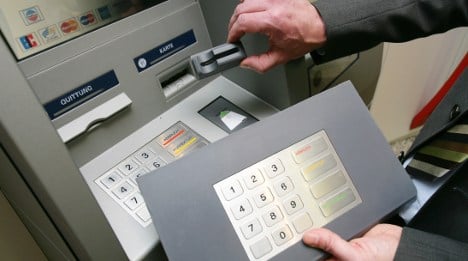The costs of ‘skimming’ unsecure automatic teller machines (ATM) rose by around half to €60 million last year, it said.
The practice of fitting cash machines with tiny cameras to film people tapping in their pin codes, and a covering the card slot with a reader to take the EC card data is on the rise, the Federal Criminal Police (BKA) reported this week. This data is used to produce copies of the cards which can be used in other machines to take money from the owner’s account.
BKA figures show that 3,183 ATMs were known to have been manipulated last year, the paper reported.
Each new cash machine costs the bank around €100,000. Banks are engaged in a race of technical skill against the gangs which manipulate the machines and make the EC card copies.
Deutsche Bank recently fitted their branches with door locks which require customers to use their EC cards to even reach the cash machines.
Great hope was also invested in the new EMV chip which prevented card copies being used – in Europe. But card gangs simply employed people outside of Europe to use the copied cards to withdraw cash elsewhere.
The banks are less concerned by the cash the gangs withdraw with the copied cards, and more by the cost of security measures in the attempt to maintain customer confidence. The latter worry means banks are loathe to talk about skimming, the paper said. Deutsche Bank would not comment on the costs of replacing 1,200 cash machines last year.
The group of banks including Deutsche Bank, Commerzbank, Berliner Bank and Postbank which form the Cash Group operating around 9,000 cash machines in Germany, had to replace around 2,500 ATMs last year according to the FTD.
The Local/hc



 Please whitelist us to continue reading.
Please whitelist us to continue reading.
Member comments